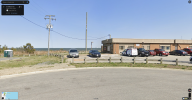No worries, it's a common misunderstanding. Same with the whole "critical infrastructure" claim.
So, is it your contention that your statement is accurate?.
Please explain the what is it that you call the critical infrastructure claim.
No worries, it's a common misunderstanding. Same with the whole "critical infrastructure" claim.
I don't know if 18 USC 795 covers all military installations and equipment.
In this case, it would be a fair assumption that naval ships under development would be classified under one of the above categories.
Why is that a fair assumption? Visitors are allowed on the base, VIPs, press, and many others are given tours...*satellites exist.* This is all happening out in the open air. What about private or commercial planes that fly nearby that give a view onto the shipyard? While there are systems within a ship that are classified and specs/capabilities that are classified, I don't know that it's safe to assume that "a submarine is being assembled here" is necessarily classified. I would bet that any photos this guy took are not much different than what you could find on Google Earth or wikipedia.In this case, it would be a fair assumption that naval ships under development would be classified under one of the above categories.
The regulation cited earlier says that it's covered by the prohibition on photography and such.I don't know that it's safe to assume that "a submarine is being assembled here" is necessarily classified.
I would bet that any photos this guy took are not much different than what you could find on Google Earth or wikipedia.
A ship in a naval yard that is out in the open can still be classified. As you mentioned, it's a moot point when China's spy satellites are just as good as ours now. The Wired article did mention that he was charged with violating WWII era laws.Why is that a fair assumption? Visitors are allowed on the base, VIPs, press, and many others are given tours...*satellites exist.* This is all happening out in the open air. What about private or commercial planes that fly nearby that give a view onto the shipyard? While there are systems within a ship that are classified and specs/capabilities that are classified, I don't know that it's safe to assume that "a submarine is being assembled here" is necessarily classified. I would bet that any photos this guy took are not much different than what you could find on Google Earth or wikipedia.
To me this seems like a case of flying while being Chinese, regardless of his intent. If the guy was white I doubt that he would've raised anyone's suspicions. I agree that the whole situation does seems suspicious because of his behavior, but I also have to question the risk/reward calculus for a foreign government in attempting such a thing and it doesn't make a ton of sense.
Uh yeah, not surprised. Read more about the plea (bargain) here: Chinese student pleads guilty to violating U.S. espionage actI saw a Nikkei Asia headline today. Shi Fengyun, the Chinese student, plead guilty.
Thanks, that's the exact headline I saw, but I lack a subscription to get past the paywall and have used up my free articles. I googled the name and saw other articles.Uh yeah, not surprised. Read more about the plea (bargain) here: Chinese student pleads guilty to violating U.S. espionage act
Otherwise: no comment.
I bet he thought he was now in a free country and didn't have to worry too much about getting caught up in anything if he didn't actually intent to do anything wrong. He thought wrong; this country has changed since 9/11. Unlike Americans who know they are walking into a trap but they go anyway and get hemmed up. If he was a Canarian instead of Chinese, they probably would have let him go after they found out he didn't have any incriminating photos and that he wasn't actually spying for the government of the Canary Islands.Here is why this guy was up to no-good. Let's reverse this culturally. American goes to a foreign country, uses drone to take pictures and video of military stuff. How does that outcome generally turn out? This is about being a smart traveller also. Avoid obvious things that can get you in trouble.
When Stasi is questioning you, I think you almost have to have a German-to-Chinese translator just in case you don't fully understand.....oh, wait. Wrong case. Ok, looks like his lawyer is of Chinese descent so it is likely they wanted to make sure he fully understand what he was pleading out to. Or, maybe the translator was responsible for receiving instructions and directions from the CCP on how to proceed. Either way, it's not uncommon for the parties to have a translator in the room, helps with the inevitable "appeal" that comes, not for the case that you were forced into accepting, but for the maximum sentence that you are clearly about to receive. Obviously there's a bit of tongue-in-cheek in this response.I am wondering why a post-grad studying at an American University would require a translator, wouldn't they have to have a decent knowledge of English to be taught there ?
It's common in the US to have graduate students who are not native-English speakers. I've interviewed many of them for software development roles and their level of proficiency is across the board. In Shi's case, his academic advisor is also a native-Chinese speaker.I am wondering why a post-grad studying at an American University would require a translator, wouldn't they have to have a decent knowledge of English to be taught there ?
Chip, tell me you don't completely believe all of this right? The fact is, we just don't know. Some of it may be fact but it doesn't make sense. Yet the government offered his a plea deal since they had nothing. They scared the crap out of him about Gitmo or Super Max or whatever military barracks is top of the list, Leavenworth. So he quickly accepted the deal and repeated what they told him: that he might be able to get on with his life and finish his studies and put this behind him but in fact, he'll probably go to jail and then get deported. And, I'm ok with this deal because the plea bargain is essential for the efficient operation of the judicial system but I'm not happy that we don't get to know what really happened and why the government thinks they caught a spy....strike that, they didn't catch anyone, he got turned in. Are we forgetting the part where an American citizen was slammed for doing the same thing? There's no real benefit to using drones to spy on the military inside the US, that doesn't make sense. It's too risky, it too obvious, and the juice is not worth the squeeze. Unless there are hundreds of these and no one is getting caught until they f* it up like SHI. Those balloons created this nonsense.Excerpts from the agreed statement of facts in plea agreement signed by Shi and his attorney:
"SHI purchased the drone referenced above on January 3, 2024. SHI first flew the drone a little before midnight the night of January 5, 2024. SHI flew the drone around BAE Systems Shipbuilding and General Dynamics
NASSCO in Norfolk, Virginia, and took pictures of drydocked U.S. naval vessels.
SHI did not return to the University of Minnesota after the incident in Newport News. He was apprehended by law enforcement on January 18, 2024, in California before boarding a one-way flight to China.
No pictures were taken by SHI’s drone on the night of January 5, 2024, that did not contain U.S. naval vessels located at BAE Systems Shipbuilding and General Dynamics NASSCO in Norfolk, Virginia."
Did you get the part about taking photos at midnight and then fleeing to California and trying to board a one way flight to China? Sound normal to you?


Not only that, but having a translator prevents the defense from later claiming he didn't understand the questions.It's common in the US to have graduate students who are not native-English speakers. I've interviewed many of them for software development roles and their level of proficiency is across the board. In Shi's case, his academic advisor is also a native-Chinese speaker.
It's one thing to do coursework for a M.S. degree where you are dealing with the same people and have more experience with understanding their speech patterns as opposed to being in a courtroom with various people with regional accents coming from you at all sides. And it's easier for the officials to understand a translator than someone who may not speak English fluently.
We use essential cookies to make this site work, and optional cookies to enhance your experience.


